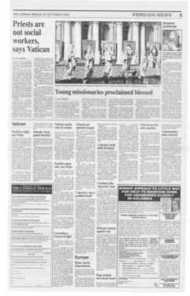Page 11, 25th October 2002
Page 11

Report an error
Noticed an error on this page?If you've noticed an error in this article please click here to report it.
Tags
Share
Related articles
I The Best Child Ever. .
Tales From Across The Great Divide
Monte Sant'angelo Perched Between Rock And Sky
"what I Think Of
Search For Justice
A drop o' the dark stuff
There is a melancholy, troubling side to Irish drinking yarns, says John Hinton Great Irish Drinking Stories edited by Peter Haining, Souvenir Press £8.99 W hen an author or editor finds a rich seam you can expect him to mine it for all it's worth. Bill Bryson has done it, catching the wrong buses to Des Moines and Perth, and shows no signs of flagging. But it is Bryson's wry observations and cheerful curiosity which lift him out of the literary crowd.
In contrast, this is Peter Haining's eighth book in an edited series, all branded Great Irish stories — which cover the supernatural, detectives, horror, humour, child-. hood, murder and mystery. Now comes Great Irish Drinking Stories: short works or excerpts by Brendan Behan, Edna O'Brien, James Joyce and so on, which he introduces competently enough before reaching for the scissors and paste.
Porter, though, is a black brew and if the book's cover gives an impression of constant gaeity and mirth, what follows — wonderfully evocative as befits the authors — is often dark and rueful. We might have been expecting echoes of the gin-sodden W C Fields, who must have been part Irish, coming across with his wife and small son, the latter carrying a projectile.
"It's a rock to throw at Dad," the horrid boy says eagerly.
"Respect your father, dear," says Mom. "What kind of rock?"
But this is not a jokey book; it is more along the lines of Oscar Wilde's observation that "work is the curse of the drinking classes". In the 1st century AD, the ordinary Irishman was allowed six pints of ale with his hardearned supper. And, down at the pub, he would quite possibly become "Glegtongued" — Belfast for spinning yarns. Whatever happened, the "Craic" would be the thing, the opium of drink and good conversation with everyone welcome, provided they had something to say.
In her 1968 short story, Edna O'Brien has the 17year-old daughter of a tyrannical farming couple cycling to her first party in her mother's old black lace dress. Parental threats about drinking follow her as she wobbles down a dark and rutted track to the village inn. Arriving earlylaglow with expectation, she is ordered to clear heavy furniture from the party room and help to prepare and serve the food. A bullock then arrives in the room and creates havoc. Party guests quickly get drunk and behave badly. She cries because her favourite boy doesn't show. Later, she beds down with the daughters of the house — she must be home early to do the milking — and wakes to find the village idiot has broken three full Guinness kegs and the place is ankle deep in the black stuff. On the way back in the cold dawn her bike develops a chronic flat tyre. All in all, she develops a chronic aversion to parties. Nearly 20 years on, as related by a young writer called Eammon Sweeney, another Mary is celebrating her coming wedding with a hen party — previously frowned on — at the Dandy Diner. In another break with tradition, all the girls are determined to get paralytic. A stripogram arrives, kisses Mary, then strips off and departs harmlessly enough. Then another stripogram disguised as an old man arrives and becomes very lewd. Finally, as the music becomes louder, a man with a gorilla mask and a long coat approaches the culprit, plus out a revolver and shoots him in the mouth and back of the head. The screams go on for hours.
In contrast, a story by Peter Tremayne tells of an early Celtic drinking competition in which one clan thief with a notably strong head for booze dies after consuming only one flagon of ale: Alcohol is suspected but it turns out to be cunningly administered poison. Helping the injuries is the popular sleuth of the time, Sister Fidelma.
James Joyce's contribution is about a travelling salesman who affects a silk hat but, in his drinking habits, frequently is found unconscious after falling downstairs and then affects amnesia. A binge drinker, he is in decline but his old friends still think he is redeemable and they enrol him in a retreat to make him a God-fearing Catholic. Whether they succeed isn't made clear, but our salesman, in refusing to hold a lighted candle, makes clear that he has an independent mind and may stray back to the taproom and plunge down the stairs again unless he keeps close to his friends and their ideals. But we have our doubts.
0 pening a literary door and then rapidly shutting it may not be the best way of boning up on a large selection of contemporary and upand-coming Irish writers. Yet a sample is better than nothing, even if these stories are grimmer than the average banter at the local. There are riches here but it's a book, like the cratur, to be sipped at rather than gulped.
Slainte! And next, how about Great Irish Inventions? One has heard them credited with the submarine., the ship's telegraph, the heart resuscitation machine. And, of course, served worldwide, Bailey's Irish cream. The Irish Times in Dublin reports an Irish Inventors' Club last seen meeting... why, at the pub, of course. Over to you, Mr Haining.
blog comments powered by Disqus















